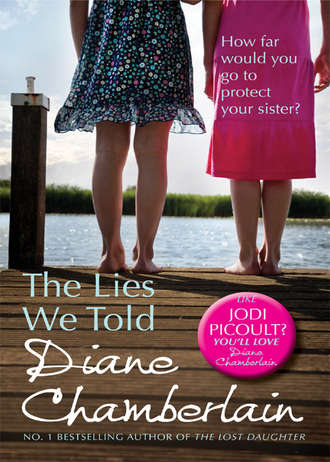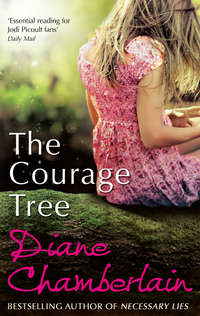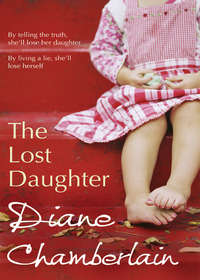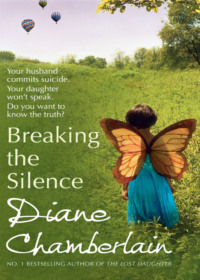
Полная версия
The Lies We Told
“It’s all right, My,” he said with a sigh. “We’ll get through it.”
Adam tucked me into our king-size bed and handed me an ibuprofen and a glass of water. I swallowed the pill, then sank back into the bed. He leaned over and kissed my forehead. “I know this has been much harder on you than I can even imagine,” he whispered. “I know that, and I love you.”
“I love you, too,” I said. I opened my mouth to say more, although I wasn’t sure what words I expected to come out, but he pressed his fingers lightly to my lips.
“Get some sleep,” he said.
I was asleep before he had even left the room, and in my dreams, I saw Frannie sitting in her wheelchair, smiling at Adam.
I have eighteen children now, Adam, she said. Too bad you didn’t stay married to me.
6
Maya
TWO DAYS LATER, ADAM AND I SAT ACROSS THE DESK from my obstetrician, Elaine, in her office. I much preferred being on the other side of that desk, talking to my patients. Educating them. Reassuring them. But my fight for a baby had put me on this uncomfortable side of the desk now more times than I could count.
Elaine thumbed through my chart where it rested on the desk in front of her. She settled on a page, running her finger down it, stopping at the midway point.
“I noticed something during the D and C that made me curious,” she said, “and I see that you didn’t answer this question on your health sheet when you filled it out a couple of years ago.”
“What question?” I asked.
“Did you ever have an abortion?” Elaine looked at me over her reading glasses.
I hesitated. I hadn’t been asked that question before, at least not in front of Adam.
“No,” Adam answered for me, and for a moment, I let the answer hang in the room between the three of us.
“Why?” I asked Elaine.
“Well, there’s some scarring in your uterus that looks like what we might see, on a very rare occasion, from an abortion. Scarring can cause difficulty with conception and especially with holding on to a pregnancy. But since you’ve never had an abortion, that’s clearly not the prob—”
“I have.” I cut her off. “I had an abortion.”
“What?” Adam leaned away from me in his chair as though I’d burned him. “When?”
“When I was a teenager.” I looked at Elaine, but could feel Adam’s startled gaze resting squarely on my face.
“Were there any complications?” she asked. “An infection?”
I remembered pain that went on and on. Pain I’d ignored. I’d had more pressing things on my mind. “I don’t think so,” I said. “I had what might have been excessive pain, but I was too young to question any symptoms.” I would never tell them how young. Fourteen years old. My father had taken me to the clinic, and I remembered the drive home, even though I’d done my best to block all memories of that day from my mind. Daddy had been so quiet in the car. So quiet that I was afraid he no longer loved me. Finally, when we neared our street, our driveway, when we neared the moment that would end his life and tear mine apart, he said, “This is between you and me, Maya, honey. It’ll be our secret.”
Oh, God. My lost babies. They were my fault. I’d certainly thought about that abortion as I struggled to get pregnant, and I’d never forgotten that first baby, taken from my body only after I’d begun to show.
“Does this mean.” I cleared my throat, unable to ask the question burning in my mind. Next to me, Adam still sat stiffly in his chair, but he reached over to cover my hand with his. I felt so grateful for him, and so undeserving. “Does this mean there’s no hope?” I finally managed to say. “That even if I’m able to conceive again, another miscarriage is inevitable?”
“Not necessarily,” Elaine said, “but it probably does explain why you’ve lost three pregnancies. The in vitro took this time, and you’ll have to talk to Dr. Gallagher about trying again. I’ll send him my report from the
D and C and you can talk with him about the pros and cons of giving it another go.”
I thought of the months of hormone shots. The always-iffy implantation. The waiting to know if I’d conceived. The hopes raised. Dashed. Raised again. All of that would be nothing compared to the anxiety of once more being pregnant, then waiting for that fist to tighten around my uterus. I didn’t know if I could go through it again.
I felt sick to my stomach by the time we got to the car. Neither of us said a word until we’d pulled out of the parking lot into the street.
“I’m sorry,” I said then.
He didn’t take his eyes from the road. “Why didn’t you tell me?” he asked.
I hesitated. “It’s something I don’t like to remember. And abortion’s not supposed to have anything to do with fertility, but … I think I was afraid it … that it did have something to do with it. I mean, I got pregnant then, and now, as an adult, I have so much trouble conceiving, so I’ve always had this niggling fear that it was somehow related. Now it looks like it is.” My voice broke. I’d already felt responsible for our not having a child, worried that Adam blamed me, subconsciously or not. Now he had a concrete reason to do so. “I’m sorry, Adam,” I said again.
“Please stop apologizing, Maya.” The muscles in his jaw contracted. “I’m just pissed off you didn’t tell me. We’ve been trying to have a baby for three years—without much luck—and now I discover that you’ve kept a pretty damn significant piece of the puzzle from me.”
“I know.” I started to apologize again, but caught myself. “I wasn’t intentionally keeping it from you,” I said. “It’s something I’ve tried to forget. I …” My voice trailed off, and I turned my head to look blindly through the window. There was no excuse I could give him that was good enough.
He didn’t ask me how old I’d been when I had the abortion or who the baby’s father was, and I was relieved. I didn’t want to think about it. The damage done back then had harmed far more than my fertility.
Was Adam now wondering if there were other things I’d kept from him? Other secrets? Worse secrets?
If so, he would be right.
7
Rebecca
“YOU WANT TO STAY OVER?” REBECCA ASKED BRENT AS they pulled into the driveway of the massive Victorian she shared with Dorothea.
“What do you think?” He’d already put the car in Park and was opening his door. She was fine either way, as long as he gave her some space. Two days after returning from San Diego, Rebecca still hadn’t recovered from the conference. Too much food and not enough exercise.
“I swear,” she said as they walked toward the outside stairs that zigzagged up the side of the building to her second-story apartment, “four days of meeting and greeting, giving speeches and soaking up gorgeous scenery is more draining than a month in the field.”
“You got that right,” he said.
The lights on the first floor were burning. Every one of them, it seemed.
“Dot’s still up,” she said as they started climbing the stairs. “We should say hi.”
They stopped at the first landing and Rebecca knocked on the door that led to Dorothea’s kitchen. When there was no answer, she opened the door—Dot never locked anything—and poked her head inside.
“You up, Dot?” she called.
“Dining room,” Dorothea said.
They walked through the kitchen. The room was turquoise with violet cabinetry, bright yellow hardware, and white appliances. All Louisa’s work. Dorothea had given her partner free rein, and although she’d complained about the color combinations while Louisa was alive, she’d done nothing to change them now that Louisa was gone and Rebecca was glad. If she ever cared enough to decorate her own spare apartment, she would use Louisa’s energetic palette.
Louisa had been neat almost to the point of being finicky, but her artist’s eye craved color, the bolder the better. She would roll over in her grave—had she been buried instead of donating her body to Duke—if she could see her dining room now, Rebecca thought as she and Brent skirted the boxes and stacks of journals and papers that littered the floor.
Dorothea looked up from her seat at the head of the table, where she was typing on one of the two laptop computers in the room. “What time is it?” she asked. Long strands of gray hair were coming loose from her braid, but she looked pretty in the glow from the computer screen. Dorothea was sixty-seven now, and every once in a while Rebecca caught a glimpse of the knockout she must have been when she was younger.
Brent walked to the head of the table and leaned over to kiss Dorothea’s cheek, a shock of blond hair falling over his forehead.
“Whatcha up to?” he asked, folding his arms across his chest as he peered down at the screen.
“Watching tropical storms forming,” she said.
Rebecca pulled out a chair at the opposite end of the table and drew the second computer toward her. “Anything that looks like trouble?” she asked, getting online.
Dorothea moved the cursor around a bit, gnawing her lower lip as she studied the screen. “Hard to say right now. A few things … maybe. Maybe not.”
The dining room had been Louisa’s red room. The walls were painted a robust, deep red and one of her paintings—a huge stunning rectangular canvas covered with apricots—brought the room to life. The dining room used to be Rebecca’s favorite room in the house, but Dorothea now had so much stuff littered all over the table and the sideboard that the room had lost its charm. It sometimes worried her to see how Dorothea had let things go after Louisa died. Dorothea still had all her faculties. She was as brilliant and committed as ever, but the lack of caring about her surroundings, which served her very well in a disaster zone, didn’t work all that well in North Carolina. She never wanted company, with the exception of Rebecca and Brent and a few other DIDA regulars, because cleaning the house was, at this point, impossible. When Rebecca took over directing DIDA, she was going to have a mess on her hands.
“Next thing that comes up, we’ll get that brother-in-law of yours in the field,” Dorothea said to Rebecca. “I know he’s champin’ at the bit.”
Rebecca clicked the page for the National Hurricane Center. “As long as it’s not for more than two weeks,” she reminded Dorothea. She doubted Adam could take off more than that. No volunteers were required to donate more than two weeks a year with DIDA, but Dorothea had a tendency to forget that little detail.
“We just came from their house.” Brent hovered over Dorothea’s shoulder, studying the screen.
“How’s Maya doing?” Dorothea asked. “Recovering okay?”
“She seemed pretty good,” Brent said, which only went to show how unintuitive he was.
“She’s miserable, actually,” Rebecca said.
Brent frowned at her. “She seemed okay to me.”
“I know her better than you,” she said. Maya could wear a smile broad enough to span the Grand Canyon and Rebecca would still be able to see the lie in it. “They’re both miserable.”
“Well,” Brent said, “they’re going out to dinner with us Saturday night. We’re going to that new Brazilian place. Want to come?”
Dorothea shook her head. “Too much to do here,” she said. She was no good at delegating. Rebecca would do a better job of spreading the work around. “Supposed to be a good restaurant, though,” Dorothea added.
Rebecca couldn’t believe Maya had agreed to the Brazilian restaurant. Maya avoided that part of Durham. A sketchy area, to be sure, but when Brent mentioned it, Adam had lit up.
“Yeah!” he’d said. “I’ve wanted to try that place!”
Seeing the sudden life in Adam’s eyes made Rebecca realize exactly how glum he’d been since their arrival. Maya must have noticed as well, because she nodded her okay. Trying to please him, Rebecca thought. Trying to make it up to him for losing another baby. Rebecca nearly suggested a different restaurant, but remembered Brent saying that she infantilized Maya and kept her mouth shut. Besides, she wanted to try the restaurant herself.
“So are you two getting married or what?” Dorothea asked with her usual lack of tact. She looked up from the screen, first at Rebecca, then at Brent, and Rebecca could see the hurricane map reflected in her enormous gray eyes.
“I’m waiting for her answer.” Brent sounded almost shy. Kind of cute, actually. Rebecca couldn’t help but smile at him.
“I’ve told him I still don’t see the point,” she said.
Dorothea tipped her head to the side to look at Brent. “How do you stand her?”
Brent laughed. “’Cause I love her,” he said.
Rebecca lowered her gaze back to the map. She knew in that moment she did love him. As her friend. As the guy who’d run with her through the streets of Durham in the middle of the night. Who’d bike with her. Jump out of a plane with her. Who wasn’t afraid to drop everything at a moment’s notice and fly off to a tsunami-wrecked village to do whatever it took to help the injured. But could she love him as her husband? That she didn’t know at all.
8
Maya
REBECCA AND I SAT IN THE BACKSEAT OF BRENT’S PRIUS, while the men sat in the front. The three of them were talking about DIDA, Rebecca with her seat belt unbuckled so she could lean between Adam and Brent’s seats, monopolizing the conversation, as usual, but I wasn’t listening. I wished I’d stayed home. I was still achy and bleeding a bit from the miscarriage and not up to trekking into the bowels of Durham for a meal I would never enjoy. But Adam was excited about it, and Brent was leaving early in the morning for Ecuador, where an earthquake had wiped a couple of villages off the map the day before. How could I say no?
It was still light out, light enough to let me see the neighborhood deteriorate block by block. I glanced at my sister, whose tanned and superhumanly toned arm was stretched across the back of Adam’s seat. Her mouth moved with words I barely heard. She was talking about the last time she was with DIDA in South America. Someone had boarded the bus she was riding and stolen money from all the passengers, threatening them with a machete. Nice, Bec, I thought. Nice, reassuring conversation for Brent the night before he leaves. But Brent was laughing, as was Adam. I was the only one who felt like I was on that bus. The only one who could see the guy coming toward me, the sharp blade of his machete catching daylight as it sliced through the air. I reached for my purse, opened it, poured my money onto the floor of the bus. Take it. It’s yours.
When Brent suggested this restaurant the other night, I thought for sure Adam would realize its location and offer an alternative. He knew this was hard for me. Either he just wasn’t thinking, or he was truly angry with me and didn’t care how I felt. But really, I was a grown woman. If I hadn’t wanted to come, I should have said so. It wasn’t up to them to take care of me. I’d kept my lips sealed, though. Adam was psyched and I was not going to give him one more reason, no matter how trifling, to be disappointed in me. He’d been cool toward me since our appointment with Elaine. I’d apologized over and over for keeping the abortion a secret from him and didn’t know what more I could do. One thing
I’d learned over the years was that I couldn’t change the past, no matter how much I might want to.
“The only time I was in Brazil,” Rebecca was saying, “my friends ordered this dish for me in a restaurant and it turned out to be boiled alligator.”
Oh, great, I wanted to say. And why do we want to go to a Brazilian restaurant?
We drove past a liquor store, where a string of women—clearly prostitutes—posed and preened on the sidewalk.
“There it is.” Brent pointed to a tiny glass-fronted building squashed between a pawnshop and a video store.
“That’s it?” Rebecca sounded both astonished and delighted.
There was no sign above the door. The word Restaurant was hand painted on a piece of cardboard taped inside the window.
“Yeah,” Brent said. “They’re so new, they don’t have their sign yet.”
“Cool,” said Adam.
“Do you see any parking?” I asked, craning my neck. I wanted a spot right in front of the restaurant so we wouldn’t have to walk any farther in this neighborhood than was necessary.
“Nothing.” Brent looked left and right.
“Is that one?” Rebecca asked. “Up there on the right? Oh. Mini Cooper.”
We drove one block. Then another. “Maybe it’s not a good night for this,” I said.
“There’s one!” Brent shouted, and he started to whip the Prius nose first toward the curb, stepping on the brake just in time to avoid creaming the motorcycle that had been hidden from our view in the parking place. “Damn!” he said. “Dude’s taking up two spots.”
“It’s puny,” my sister said. “Let’s move it!” Before I knew what was happening, she and Adam were out of the car, laughing as they half lifted, half rolled the bike out of our way. I watched the lightness in their movements, the energy, unable to remember the last time I’d seen Adam laugh, and I was glad I’d agreed to come despite my reservations. I wanted to see that smile on my husband’s face, even if I wasn’t the person to put it there.
Brent managed to squeeze the car into the parking place once the motorcycle was out of the way. We were in front of a wig store. The window was full of mannequin heads, most of them dark skinned, wearing wigs in every shade of the rainbow.
Adam offered me a hand as I got out of the car. “Oh, Maya,” he said, sudden sympathy in his voice. “We should have dropped you off out front. Are you up to the walk?”
He meant physically, and physically I was fine. “I’m okay,” I said, already starting to walk, setting a brisk, brisk pace.
“Look out,” Brent said as we bustled past the wig shop, “this woman’s hungry!”
The restaurant was long and narrow and packed, but we found a table in the rear. As we walked toward it, I saw one of the E. R. docs from Duke sitting against the far wall, and she waved. I waved back. Seeing her there gave me courage, as if it had not been a stupid idea to come to this part of Durham for dinner after all. I began to notice the other patrons. Some dressed up; most dressed down. White, black, brown. Probably some native Brazilians, happy to enjoy a meal that reminded them of home.
Rebecca and I took the far side of the table and sat down, facing the front of the room. By the time Brent and Adam sat down across from us, I was starting to relax. I liked this place, I decided. I liked the lively atmosphere. The laughter. The spicy smells.
The menus were handwritten in Portuguese and filled with bad photographs of the entrées. Sitting across from each other, Adam and Rebecca leaned over their menus, trying to pronounce the names of the dishes. The table was so small that their heads nearly touched. Their hair was the exact same shade of brown, I noticed, and very nearly the same length, Adam’s too long and my sister’s too short.
“I want this one.” Rebecca pointed to one of the pictures. “It’s the most bizarre-looking thing on the menu.” From where I sat, the entrée looked like a pile of pink flesh covered with some sort of leafy green vegetable.
“I’m going to pass on that,” Adam said with a laugh, and I was glad he hadn’t fallen completely under Rebecca’s spell. When he told me he was joining DIDA, I knew he’d finally succumbed to her persuasion. I’d always been glad that she and Adam got along so well, but I wished she’d left him alone about DIDA. I loved my sister, but she could be a steamroller.
We ordered beers while we continued to study the menu, and Adam held up his bottle in a toast to Brent.
“Drink up!” he said. “This’ll probably be your last cold brew for a while.”
Brent groaned, but he was grinning. “It’s going to be so bloody hot down there,” he said.
“Next trip is yours, bro-in-law.” Rebecca tapped her bottle to Adam’s.
“Is that a threat or a promise?” Adam asked.
“Both,” she said.
An African-American woman was walking toward the rear of the restaurant, a little girl in her arms. I suspected she was heading for the restroom, but she was looking straight at me, a broad smile on her face.
“Do you know her?” Rebecca whispered.
She wasn’t the least bit familiar.
“Dr. Ward!” she said, and for a moment, I thought she meant Rebecca, but her eyes were definitely on mine.
“Hi.” I smiled, struggling to place her. Then I noticed the little girl in her arms. “Taniesa!” I said, jumping to my feet. I reached for her, and Taniesa came easily into my arms, as though she’d never connected the pain from her surgery the year before with me. She clutched a small stuffed panda bear in her hand. “You’re getting huge, baby girl.” I planted a kiss on her cheek.
“I seed you and Mama said no, that isn’t you, but it is too,” Taniesa said.
“And you were right. How are you, honey? How’s that arm of yours?”
“Good,” she said, and she lowered her head to my shoulder as if she wanted to go home with me. I could picture the X-ray of Taniesa’s left arm, shattered in a tricycle accident, as clearly as if I’d seen it only minutes before. I’d never had a photographic memory when it came to reading, but show me a juicy X-ray or CAT scan or MRI image, and I’d never forget it.
“You mean the world to us, Dr. Ward,” Taniesa’s mother said. I couldn’t remember her name. Taniesa’s last name was Flanders, but I knew her mother’s surname was different.
“I’m so glad we could fix her up,” I said, reluctantly letting go of the little girl and handing her back to her mother. Taniesa had on a sweater against the air-conditioned chill of the restaurant, but I ran my fingers down her arm, picturing the scar beneath the fabric.
Rebecca gave the girl’s mother a little wave. “I’m Dr. Ward’s sister, Rebecca,” she said.
“Oh,” I said. “Sorry. This is Brent Greer and my husband Adam Pollard, and this is—”
“Lucy Sharp.” Taniesa’s mom saved me the embarrassment.
“I like that panda, Taniesa,” Adam said. “Is it a girl or a boy?”
Taniesa looked at the stuffed toy as if she was just noticing it. “Girl,” she said.
“She have a name?” Adam asked.
“Taniesa.”
We all laughed, and Taniesa grinned.
“That was so smart!” Adam’s eyes were wide with feigned wonder. “You’ll never forget her name, will you?”
God, it was strange watching Adam with other people! I’d forgotten what he was like. How playful he could be. How he used to be playful with me. Our lives had become far too consumed by fertility and pregnancy and worry. We needed to change that, yet I knew he wasn’t ready to give up. I knew he wanted a child more than he wanted the sun to rise in the sky.
“Isn’t this some place?” Lucy Sharp asked. She glanced down at our plateless table. “You haven’t tried anything yet?”
“Not yet,” I said.
“What do you recommend?” Brent asked.
“Oh, Lord, anything you get’s going to fill you up. Try the Churrasco. It’s barbecue, Brazilian style. I never thought I’d like Brazilian food. Who would’ve guessed? But my sister-in-law got me in here a couple weeks ago and now she can’t get me out.”
Our waitress came to the table just then, and Lucy Sharp took a step backward. “I’ll get out of your hair,” she said, “but Taniesa wanted to be sure we said ‘hey.’ ”
“I’m glad you did,” I said. “Bye, Taniesa.”
The little girl reached for me one more time, and her mom leaned over to let her kiss my cheek.
I have the world’s best job, I thought. I watched them walk back to the front of the restaurant, and even before I saw them sit down again, I felt happy and at home and hungry enough to eat alligator meat.
The food was delicious and I was eating coconut flan when I noticed that the crowd was beginning to thin out.
“I’m drunk,” Brent admitted happily. He was. Adam was not far behind him. His eyes were glossy and a little unfocused, and the grin he’d been wearing most of the evening was lopsided in a way that made me smile.









